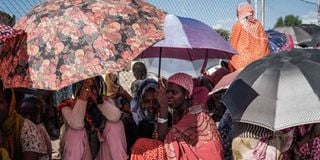Sub-Saharan Africa conflicts exposing more women to Covid-19

Refugees who fled Ethiopia's Tigray conflict at the border reception centre in Hamdayit, Eastern Sudan, on December 4, 2020.
What you need to know:
- More than 60 per cent of the 2.5 million peopledisplaced within Ethiopia’s Tigray, Darfur in Sudan and the Central Africa Republic(CAR) in the ongoing conflicts in the regions are girls and women.
- UNHCR warns that the fresh conflicts in Sub-Saharan Africa could lead to a sharp increase in Covid-19, especially among girls, women and children if no urgent measures are taken.
- The interruption of Covid-19 surveillance and control activities in the region, coupled with mass displacements and overcrowded conditions, is feared to have facilitated massive community transmission of the pandemic.
About 2.5 million people have been displaced within Ethiopia’s Tigray, Darfur in Sudan and the Central Africa Republic(CAR) in the ongoing conflicts in the regions. More than 60 per cent of them are girls and women.
The United Nations High Commissioner for Refugees (UNHCR) is now warning that the fresh conflicts in Sub-Saharan Africa could lead to a sharp increase in Covid-19, especially among girls, women and children if no urgent measures are taken.
Spokesperson for the office of UNHCR Boris Cheshirkov, in a press statement reported that more than 300,000 people had crossed the border into neighbouring Cameroon, Chad, Democratic Republic of the Congo (DRC) and the Republic of Congo, with tens of thousands being displaced internally.
Makeshift shelters
“Most newcomers are staying with host communities or in makeshift shelters,” said Mr Cheshirkov.
He noted that their urgent needs include water and shelter as well as health and sanitation facilities to prevent the spread of Covid-19 and other diseases.
The United Nations (UN) has also raised concerns over potential "massive community transmission" of the coronavirus in Ethiopia's northern Tigray region, amid displacements, conflict and a damaged health care system.
In its first on-the-ground assessment from Tigray, published last week, the UN decried the dire humanitarian crisis facing the region, where at least two million are in need of urgent aid.
The report said hospitals, schools and other public service facilities have been ravaged since the conflict between Ethiopian forces and the Tigray People's Liberation Front (TPLF) began in early November.
Overcrowded condition
"The interruption of Covid-19 surveillance and control activities for over a month in the region, coupled with mass displacements and overcrowded conditions in displacement settings, is feared to have facilitated massive community transmission of the pandemic," the report said.
The report was based on two humanitarian missions conducted by the UN and government agencies in December. The fact-finding teams stressed that the situation was "dire," and that two out of four refugee camps in Tigray remained inaccessible.
Ethiopia has one of the highest Covid-19 caseloads in Africa, with at least 127,000 people infected.
Social distancing
Relief Web has also indicated humanitarian actors in CAR have recorded an almost two-fold increase in the number of cases of violence against girls and women as a result of restrictions related to Covid-19.
The agency is worried that the conflict will even make things worse as people, most of them women and girls, flee their homes to refugee camps where social distancing and sanitation conditions are pathetic.
UNHCR is already seeking $151.5 million this year to respond to the CAR situation. The agency is calling on the international community to urgently expand support to the CAR humanitarian response to allow more aid to reach those in remote areas.





